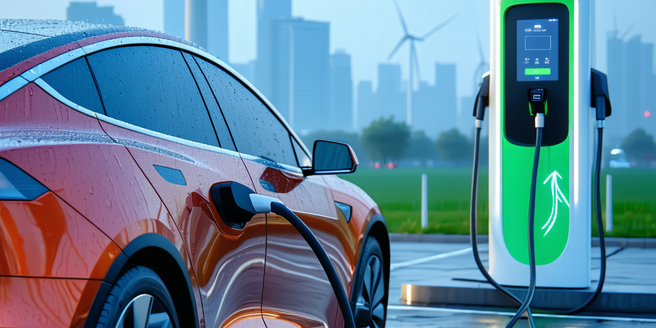Auto Industry Tech Shifts

The Rise of Electric Vehicles: A New Era Begins
The automotive industry is on the cusp of a transformative era with the advent of electric vehicles (EVs). As environmental concerns and a push for sustainability dominate the global agenda, EVs have emerged as a crucial solution. They offer reduced emissions, lower operating costs, and align with governmental policies aiming for cleaner air. The infrastructural advancements, like widespread charging networks, are pivotal in supporting this shift. Major automakers are investing heavily in EV technology, which is fostering innovation and competition. This wave heralds a significant change in consumer preferences, encouraging more eco-conscious buying decisions. While hurdles like battery disposal and range anxiety exist, technological progress promises to overcome them, paving the way for EVs to become mainstream.
Autonomous Driving: From Theory to Reality
Autonomous driving technology is steadily advancing from concept to widespread implementation, representing a monumental shift in the automotive landscape. By leveraging advanced sensors, machine learning, and AI, vehicles are becoming capable of navigating complex environments with minimal human intervention. This evolution promises enhanced safety, as driver errors—currently the leading cause of accidents—are minimized. However, transitioning to fully autonomous vehicles is not without challenges. Regulatory frameworks, public trust, and ethical dilemmas in decision-making algorithms are some of the main obstacles. Nonetheless, progress in technology and infrastructure, alongside strategic partnerships between tech companies and automakers, continues to propel the industry toward a future where self-driving vehicles are a norm, assuring increased convenience and efficiency.
The Role of AI in Revolutionizing Car Manufacturing
AI is revolutionizing car manufacturing by streamlining production processes, improving quality control, and advancing customization. Machine learning algorithms analyze data at an unprecedented scale, optimizing supply chain operations and forecasting maintenance needs. AI-driven robotics facilitate precision and speed on production lines, reducing human error while enhancing safety for workers. In design, AI allows manufacturers to simulate thousands of potential iterations, ensuring the optimal configuration is chosen before physical models are made. This rapidly accelerates development cycles, enabling companies to bring innovations to market faster. Meanwhile, predictive analytics refine inventory management, cutting costs and waste. As auto manufacturing becomes increasingly data-driven, AI is pivotal in driving efficiency and innovation, ensuring manufacturers remain competitive in a rapidly evolving market.
Connected Cars: Enhancing User Experience Through Tech
Connected cars are reshaping the driving experience by integrating cutting-edge technology directly into vehicles, ensuring that they stay interconnected with the world around them. Through IoT and smart sensors, connected cars offer real-time data on traffic, road conditions, and vehicle performance. This connectivity enhances safety and efficiency, allowing for predictive maintenance alerts and dynamic route adjustments to avoid congestion. Furthermore, the integration of in-vehicle infotainment systems keeps passengers entertained and informed, while also enabling seamless integration with smart home devices. Cybersecurity, however, remains a challenge as the rise of connected cars increases the threat landscape. Despite such concerns, the automotive industry is actively pursuing security measures to protect user data and uphold privacy, ensuring that the benefits of connected cars far outweigh potential drawbacks.
Sustainability Trends: Innovations in Green Tech
As environmental awareness intensifies, the automotive sector is embracing sustainability trends through innovations in green technology. Key advancements include the development of smaller, lighter vehicle components that enhance fuel efficiency while reducing emissions. Renewable energy sources, like solar panels integrated into vehicle exteriors, are gaining traction as alternative power sources. Moreover, the push for biodegradable materials in car manufacturing is reducing the long-term environmental impact. Recycling techniques have also improved vehicle lifecycle sustainability, with manufacturers taking a circular economy approach. The increasing popularity of hybrids and electric vehicles underscores the shift towards cleaner mobility. This transition is supported by government incentives and targets for carbon neutrality, which underscore the essential role of green tech in achieving broader environmental goals and fostering a planet-friendly auto industry.
Challenges and Opportunities in the Tech-Driven Market
The tech-driven market presents both challenges and opportunities for the automotive industry as it navigates the complexities of rapid technological change. One significant challenge is the need for substantial investment in R&D to keep pace with advancements and consumer expectations. The integration of emerging technologies, like AI and IoT, requires reimagining business models and upscaling workforce skills. Meanwhile, regulatory compliance and cybersecurity are critical concerns as connectivity increases the risk of data breaches. However, these challenges are offset by opportunities, such as the potential for enhanced customer engagement through personalized experiences and the creation of new revenue streams. By capitalizing on data analytics and fostering innovation, automakers can capture market share and drive growth in a competitive landscape.